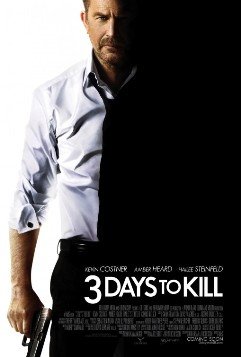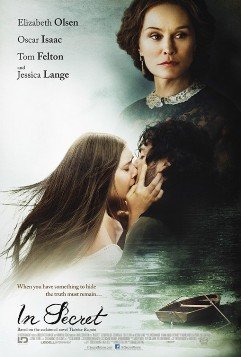February 21, 2014, - 5:11 pm
Wknd Box Office: 3 Days to Kill, Pompeii, In Secret, Like Father Like Son, Omar (Palestinian Propaganda Alert)
I liked two out of five new movies which debut at theaters today. But I really liked only one of them.





* “3 Days to Kill“: If you like writer/director/producer Luc Besson (of the Taken, Transporter, Nikita, and other movies), you will like this. It is sort of like “Taken” – read my review (though not nearly as good, but good enough). I did. It’s fun, light, filled with action and suspense. And it’s a nice mindless escape from reality. It’s also quite funny. The bad guys get theirs. My only objection is the usual one these days: the villains are these silly, nebulous Slavic types who are evil for murky reasons, because Hollywood now completely blackballs the topic of Muslims as terrorists or villains (even though that’s stark reality). It’s ridiculous and the Slavic villains are stale and yawnworthy.
And while I’m not normally a fan of Kevin Costner, at age 59 he looks terrific in this movie, better than I can remember ever seeing him look. This is probably the start of a series of action movies with him as the CIA character he plays here. And he’s perfect in the role, far better than the other aging Hollywood ’80s stars who’ve tried to reclaim their stardom from that era.
Costner is Ethan, a successful, reliable CIA assassin, who never fails to take out his target. But now he’s sick and finds out it is terminal cancer. He’s given three months to live. Ethan, who hasn’t been much of a father in his teen daughter’s (Hailee Steinfeld) life or that of his wife (Connie Nielsen) is estranged from them. But, with the news of his cancer, he decides to get out of the business and return home to them. When he gets back to his Paris apartment, he finds that it is occupied by a family of squatters from Africa. And just like in America, he learns he cannot get them out until after going through a long eviction procedure. The Paris police also tell him he must wait until April even to start that process because France protects squatters from eviction during the winter. So Costner reunites with his wife and daughter and moves in with them.
But, while he thinks he’s retired from the CIA, a bombshell CIA handler (Amber Heard, Johnny Depp’s new fiancee) who works for the CIA Director says he must kill “The Wolf,” an underworld Russian arms dealer who sells weapons to Syrians or Syrian rebels (since they’re both bad guys, I lose track of these things nowadays). She gives him shots of an experimental drug that might save him from the cancer in exchange for the kill (plus a check for $150,000).
The rest of the movie is Costner trying to be a father to his daughter all while trying to get to The Wolf. He tries to endear himself to his teen daughter, save her from her reckless behavior, and be a father in her life, which is charming. And he’s also involved in shooting and car chases and also torture and beating of suspects. It’s a somewhat violent movie (though not that violent relative to most of the movies out there).
This movie’s not a masterpiece, but it’s fun and a great weekend escape. And it’s never boring.
TWO-AND-A-HALF REAGANS


![]()
Watch the trailer . . .
* “Pompeii“: I missed the screening of this because it was at the same time as the screening for “3 Days to Kill,” and I chose that. I made the right choice. But I went wrong in choosing to go to the late night showing of this, last night, so I could review it for you. This is absolutely awful. I was bored to tears. And it was extremely cheesy and pointless. As I struggled to stay awake and sit through this, I could hear Nancy Kerrigan wailing in my head, “Why? Why?” Why, indeed. What a bleepin’ waste of time. So glad I didn’t throw more money down the toilet and spring for the 3D version. Normally, I would have been annoyed by the two guys sitting behind me constantly mocking the movie and its dialogue and laughing endlessly. But it actually made this absolutely unbearable movie a little more tolerable. Those guys should have walked out on this movie. I wish I had.
The story: a “beautiful” princess (Emily Browning) of Pompeii is returning from a visit to Rome, when she falls in love with a Celtic slave (Kit Harington) who spares her horse from suffering after an injury. On her return to Rome, she is endlessly pursued by a Roman senator (Kiefer Sutherland), who slaughtered the Celtic slave’s entire family and most of his city-state. But she loves the slave and they escape together, after he’s forced into fighting in the coliseum and wins. However, as they try to escape, Mt. Vesuvius keeps erupting and Pompeii is engulfed by lava and they are all killed. The end. Who cares? I certainly did not.
The movie is filled with endlessly cheesy lines and repetitive–repetitive to the nth degree!–scenes of the princess trying to escape with the slave, of the Roman senator pursuing her and trying to destroy him, and the volcano blowing and its lava flowing.
Long, slow, boring. Skip this.
TWO MARXES


Watch the trailer . . .
* “In Secret“: Oy vey. This long, slow, boring movie, based on an 1867 Emile Zola novel, is like nails scratching a chalkboard or chewing on tinfoil. Yuck. It’s dark and depressing, but not in any meaningful or entertaining way. And I could have done without the stupid masturbation scenes, too. When I first saw the matronly actress who co-stars in this, I thought, “Wow, this woman looks like the lion lady [the wealthy New York socialite who had so much plastic surgery, her hideous face looks like a lion].” But, then, I realized, “Oh, it’s Jessica Lange.”
The Olsen Twins’ sister, Elizabeth Olsen, now the overrated darling of indie flicks, stars as Therese, a French girl, whose mother has died. Her father dumps her at the home of his sister, Madame Raquin (Lange), who raises her along with Raquin’s sickly son, Camille (Tom Felton). She forces Therese to marry Camille. Yup, her first cousin. They move from the French country to a dark Paris shop that Raquin runs. They love on top of the shop. Therese is very unhappy and unfulfilled in the loveless marriage to her sickly first cousin. Soon, though, she meets and falls in love with Laurent (Oscar Isaac) and begins a sexual affair with him. Laurent convinces Therese that they should murder Camille, so they can be together. But after they drown him and get married, they are completely unhappy because Therese cannot handle that they murdered her husband. Meanwhile, they must care for Madame Raquin because she is sickly, cannot speak or feed herself, and is confined to a wheelchair. Eventually, they kill themselves. The end.
Why did I sit through this? Only so you don’t have to. The best I can say for this is that it had a good moral message: don’t murder. Thanks, Hollywood, for the tip.
Just awful.
THREE MARXES



Watch the trailer . . .
* “Like Father, Like Son [Soshite Chichi Ni Naru]“: This is a Japanese movie with English subtitles. Most of the Japanese movies they screen for us range from good to very good, and this one isn’t bad either. The movie has an interesting premise. An upper (or upper middle) class couple learns that their son was switched at birth with a working class couple’s son. The son they believed was theirs and whom they’ve raised for six years is not their son by birth. The idea isn’t new. I recently reviewed a pro-Palestinian propaganda film made by Jews, “The Other Son” (read my review), which had the same premise. But this movie explores the situation in a much more realistic, meaningful way. I could have done without the classism and class war propaganda evident in this film, though.
The professional, workaholic father is portrayed as a snob who dislikes the working class father and his way of life. The upper class father is portrayed as largely absent and consumed by work and too much of a perfectionist and demanding father. The working class dad is fun, the kids love him, and he can fix anything. The working class family is fun-loving and close. The kids take a group bath with the dad. The upper class dad is cold and not as close. On the other hand, the working class dad is constantly trying to game the system. He charges meals and anything he can to the hospital that is blamed for the switch of the sons. The families eventually choose to have each others’ sons try out short stays with their real families as they ponder whether or not they should switch to their real birth sons for good.
While I didn’t like this stark, stock contrast, I did like that the movie showed the importance of a loving father in kids’ lives. And that, in the end, is the message of this thoughtful and entertaining movie. My only other reservation with this movie is that it was a little slow and long. They could have cut at least a half hour from this. I don’t think I’d pay ten dollars to see this, but I would rent/Netflix it.
TWO REAGANS


Watch the trailer . . .
* “Omar“: I’m not surprised that this slow, boring, poorly-written Palestinian propaganda film is nominated for an Academy Award at this year’s Oscars telecast. But, even as propaganda, it fails miserably and isn’t too effective. I’m not too concerned with it. The movie shows us that Palestinians are lying, conniving pieces of crap who cannot be trusted, especially by each other . . . and then they blame the Israeli (and kill him) for their own murders and betrayals. If that’s their attempt at propaganda, good luck with that, although I’m sure those who hate Israel will see this as a fabulous movie and take from it whatever they can to bolster their agenda. The pro-HAMAS/Hezbollah ADC is hosting private showings of this crappy movie all weekend. While the movie shows the main character climbing up and down a rope over the fence Israel installed to keep terrorists out, the main character is, in fact, a terrorist who helps murder an Israeli soldier. And it demonstrates why Israel found it necessary to build the fence.
I should note that it’s perhaps inappropriate to call this a “Palestinian” movie, as its writer and director, Hany Abu-Assad, who was born in Nazareth, ISRAEL, holds an Israeli passport and Israeli citizenship. He comes and goes to Israel as he pleases and Israel has idiotically given him money for his crappy pro-Palestinian, HAMASnik propaganda films. As you’ll recall, his “Paradise Now” was also nominated for an Academy Award and promoted and glorified Palestinian Muslim homicide bombers. And Israel helped fund that, too. As I always say, who needs Bin Laden Studios, when the State of Israel funds all of the worst anti-Israel, anti-Semitic propaganda films? And you have to ask whether or not the Oscars have officially recognized all of Israel as “Palestine,” since the “Academy” says this movie is a film from “Palestine.” Abu-Assad’s birthplace of Nazareth is within Israel’s “Green Line,” and Assad is still an Israeli citizen, NOT a Palestinian Authority citizen. Hmmm . . . sounds like the Academy Awards have embraced the Map of Hate–you know, the one with no Israel.
Omar is a Palestinian terrorist in a terrorist cell. His smaller group of three–himself, his friend Amjad, and Tarek (who is the older brother of the girl Omar loves, Nadia)–is part of a larger terrorist group. Tarek is their leader and the three train in shooting and other operations as they plan to murder an Israeli soldier. One night, the three of them carry the operation out, murdering an Israeli soldier who is standing at a distance at a border checkpoint. But Israel is on to them and arrests Omar. In the Israeli jail, a man I instantly knew was an Israeli operative poses as a fellow imprisoned terrorist and gets Omar to talk. Omar talks just enough to implicate himself in the murder he conspired to commit. The Israeli handler uses that to get Omar to agree to serve as an informant. But Omar double-crosses the Israeli and is re-captured. He agrees again to serve as an informant (and betrays the Israelis again).
Omar knows there is another informant and it isn’t him because he tricked and lied to the Israelis and didn’t really inform. He learns that his friend Amjad is an informant and informed on everyone to the Israelis. Amjad lies and leads Omar to believe that Amjad impregnated Nadia, so Omar says they must tell Tarek she’s pregnant with Amjad’s kid. When they tell Tarek that, he tries to honor-kill Amjad, but Amjad and Omar kill him. Then, Omar gives his blessing to Amjad to marry Nadia, even though she was the woman of his dreams and his goal was to marry her. Two years later, Omar learns that it was all a lie. Not only was Amjad an informant to the Israelis, but he tricked Omar into thinking he impregnated Nadia, so he could steal her away from Omar. In fact, he hadn’t impregnated her. To get his revenge, Omar kills his Israeli handler. Yup, blame the Jews!
Oh, and by the way, Amjad does a (bad) Marlon Brando impression. I suppose that’s supposed to make him a more “endearing” terrorist and whitewash the murder of the Israeli soldier he shot. Nice try, no cigar. (And, BTW, Brando was a Jew-hater just like these guys, but at least he never murdered the Jews.)
Like I said, the movie is awful, boring, and silly. If this is were Palestinians’ best attempt at propaganda, they would be losing. Sadly, it isn’t, and they aren’t. allahuFUBAR.
FOUR ARAFATS PLUS TWO OBAMAS PLUS TWO MARXES PLUS A TWO BIN LADENS
![]()
![]()
![]()
![]()
![]()
![]()
![]()
![]()


![]()
![]()
![]()
Watch the trailer . . .
Tags: 3 Days to Kill, 3 Days to Kill movie, 3 Days to Kill movie review, 3 Days to Kill review, Amber Heard, Connie Nielsen, Elizabeth Olsen, Emile Zola, Emily Browning, Hailee Steinfeld, Hany Abu-Assad, In Secret, In Secret movie, In Secret movie review, In Secret review, Israel, Israeli movies, Japanese movies, Jessica Lange, Jews, Kevin Costner, Kiefer Sutherland, Kit Harington, Like Father Like Son, Like Father Like Son movie, Like Father Like Son movie review, Like Father Like Son review, Luc Besson, movie, movie review, Movie Reviews, Omar, Omar movie, Omar movie review, Omar review, Oscar Isaac, Palestinian movies, Palestinian propaganda, Palestinian propaganda films, Palestinians, Pompeii, Pompeii Movie, Pompeii movie review, Pompeii review, Soshite Chichi Ni Naru, Soshite Chichi Ni Naru movie, Soshite Chichi Ni Naru movie review, Soshite Chichi Ni Naru review, Three Days to Kill, Three Days to Kill Movie, Three Days to Kill movie review, Three Days to Kill review, Tom Felton


I saw 3 Days to Kill and thought Debbie’s review was perfect. The film is “light” and “fun” as she writes, and actually it’s my favorite action film so far this year (all two months of it).
Kevin Costner is as lethally efficient and ruthless with the bad guys as any Steven Seagal, so there’s some wry, black humor here as comic or heart-warming domestic scenes are juxtaposed with bodies that pile up. That might not sound all that great, but it works well because Costner is so funny (playing both to type and against it as a nonchalant CIA tough-guy assassin).
The story is politically incorrect as we expect from Luc Besson: the bad guys are Middle Eastern Arabs rather than American gun nuts or greedy Russian capitalists, and when African squatters move into Costner’s apartment, the police insist absurdly they can’t be ejected because “it’s too cold in the winter and there’s a law against it.” Talk about political incorrectness: there’s even a line when Costner comments “Father knows best.”
Anyone who completely dismisses this film as just time-wasting fluff doesn’t understand the importance of subtextual cultural values. A film that promotes good fathering, reinforces masculine values, ridicules politically correct taboos and is NOT progressive-Marxist is a step in the right direction.
Burke on February 22, 2014 at 10:30 am